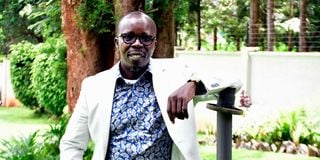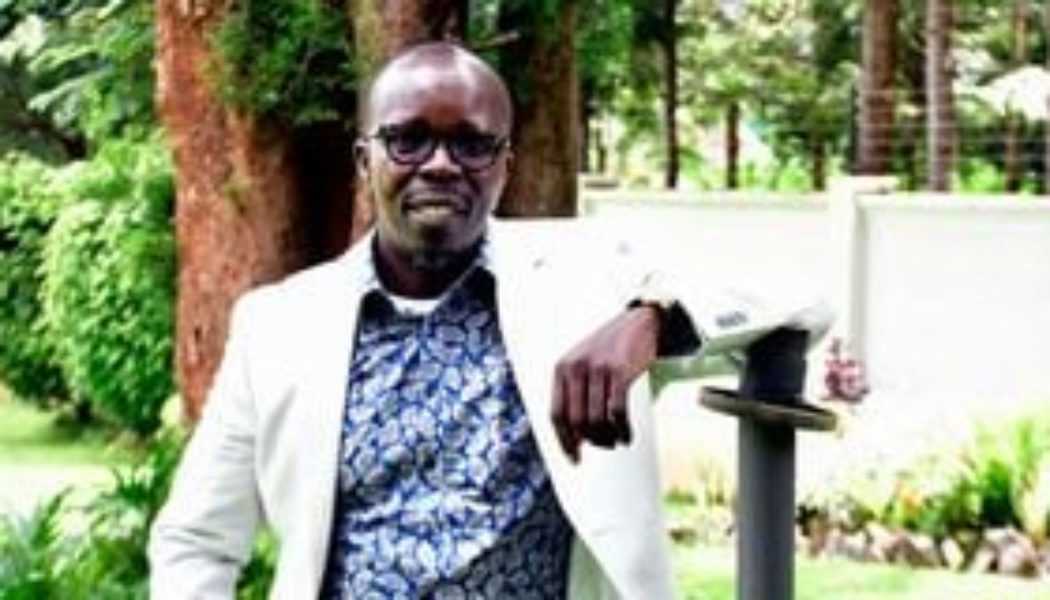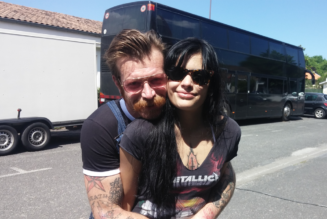Eric Gumbo is holding court in his backyard, a sweeping garden in Nairobi’s Runda. The green of the Pemba grass is almost assaulting to the eye, the covetous type of green that the common idiom is based on. Like all grass/green lovers, he talks about the long arduous journey with this garden. However, agrostology does not take all his time, in fact as a man with a formidable schedule, he probably only enjoys the garden a couple of days a week.
Other times he suits up as a Managing Partner of G&A Advocates where over the years he has enhanced and focused on Dispute Resolution and Commercial Law. (You remember his name as the IEBC lawyer in three election petitions.)
He has undertaken programmes in financial markets from Yale University, arbitrations from the Chartered Institute of Arbitrators, and fintech law and policy from Duke University. And, unsurprisingly, given his studious dedication to his greenery, he is currently undertaking a course in green business strategy from the Hong Kong University of Science and Technology.
“I desire to meaningfully support the global call for sustainable development as well as a secure environment for the future of generations,” he says.
Eric, as an interviewee (and not an uninteresting one, for sure), has impressive manipulation of the language as you would expect from a great legal mind. No answer leaves his mouth not tied neatly with a ribbon.
What do you recall about the first house you lived in when you were starting as a young lawyer?
It was a bedsitter. I had no bed, no curtains, no wardrobe. I’d hang my suits against my window, acting as curtains to give me some privacy. Yes, but also because I didn’t own a wardrobe. The suits would never cover the whole window but I didn’t mind, not until weekends when I wanted to sleep in and light would come through those gaps preventing any sleeping in.
This was in Eldoret, a humble estate called Pioneer. I was working for Rosaline Odede, the current chair of the International Human Rights Commission. It’s her firm where I did my pupilage and also began my legal journey. I worked there for three or so years before I moved into my practice, you know, got my name on the door. That was 2006.
Why did you want to become a lawyer?
Remember the case of SM Otieno? The whole story around the Umira Kager clan and Wambui? That is where law first piqued my interest. It made us understand a lot more about the interaction between society and the law. For me it wasn’t even so much about the substance of a case but what these people are doing out here. I enjoyed the show, I enjoyed the banter. It didn’t matter who was right, or who was wrong.
Right and wrong is always a big conversation in the law but also a very limited because what is right is not necessarily what is appropriate. And so if you go by the strict four corners of the law, more often than not, you find yourself in a place where you have an outcome that you’re not so sure whether it is a success.
Is there anything in your childhood that would have suggested that you’d become a lawyer?
No. I grew up in Eldoret for the better part of my life. My mom and late dad both worked there. I attended a municipal school called Uasin Gishu Primary School.
How I ended up in Nairobi is very interesting. I had applied to be placed in the panel for the IEBC but there was never any response so one day I decided to come and ask why I wasn’t shortlisted. I remember meeting the manager, a gentleman called Mahamud Jabane. I told him, “Mr Jabane, my name is Gumbo and I have come here for only one reason, to get my regret letter.” He was intrigued because nobody travels to pick up his regret letter.
Anyway, it turned out the process was not yet done. He asked if I worked for any other government agency and I told him, Rift Valley Technical Training Institute. In that case, he said, “I have a small case you can help me within Eldoret.”
It was a small dispute about a small washroom that had been constructed to support the elections that year. The person [contractor] had not been paid, he had sued for Sh250,000. I left Nairobi with my first brief tucked under my arm. The issue was resolved and that first case set me on this journey.
What would you say was your tipping point in your career?
I’m not so sure whether I would call it that. Perhaps I’m still looking forward to that tipping point because apart from the ordinary quest by any lawyer to get a client and get paid, there’s something about the impact and how that looks.
My former boss, Roseline always quipped, “Some people are so poor, all they have is money.” I think now I’m looking more towards impact than money. However, I’d say that IEBC gave me a great experience and perhaps the most impactful experience.
Assuming we agree that you are successful in your career, what are some of the by-products of success that you find less appealing?
The stratification that somebody imagines that you are here [raises palm] and they are here [lowers palm]. It is more of a mindset question, which does not necessarily sit well with me. And life also does not allow you to tell the next person that it doesn’t sit well because once they form their opinion, they form it.
Why is that perception an issue, especially if there might be truth to it?
Because then it tends to create a barrier which sometimes is not necessarily there. It makes somebody imagine that this is a preserve of that group and this is a preserve of the other group. And more often than not, it’s a question of just imagination.
I’ve realised that it is important to try as much as possible to remove that perception and when there’s no room for conversation around it, then we realise that many people who would have otherwise been beneficiaries of our experiences, and failures miss out on that opportunity.

G&A Advocates LLP Managing Partner Eric Gumbo during the interview on April 13, 2024.
Photo credit: Francis Nderitu | Nation Media Group
What does it take to get where you are? Do you think there is a formula that a young aspiring lawyer can subscribe to and find success?
Yes, there is a formula to the madness and these are things we know, they have been written in books extensively. There’s nothing like a free lunch. There must be something you’re willing to give, and how much are you willing to put into that thing, you know?
And so there are things that have been documented. If you read, for instance, Napoleon Hill’s Think and Grow Rich, it speaks in a very granular sense about what that formula is. The book gives you principles that one can apply, sometimes one applies these principles without being aware of them like waking up at 4:30 am and reading a judgment that’s got nothing to do with my case but to expand my worldview. Principles like that.
I like consistency. The outliers like Simon Makonde who woke up and became a prominent lawyer overnight will probably crash as fast as they rise. What works for me is consistency, hard work, and discipline.
Is there luck involved in all this?
I don’t see any place of luck in this. [Pause] No, there is no place for luck. I don’t see it.
What are your own personal fears and anxieties?
Very interesting. [Pause] Sitting where I sit today, I fall bang in the middle of a society where I identify with the old but I’m also able to reasonably understand the anxieties of the young. What gives me fear and anxiety is that gap, both within the profession and outside, because it is so wide.
We’ve left our younger brothers and sisters to their own devices. We don’t invest sufficient time in walking the journey with them and have forgotten to hand the values we grew up with to them. You can imagine the consequences of raising an intolerant generation and how it translates into society. Patience is lacking in the new generation, the ability to plant and wait eight months for harvest. What are we doing, what can we do, to help them navigate this?
What cases would you absolutely not touch with a barge pole?
I’ve learned in life never to say never, but I tend to avoid cases that may have personality conflicts in them; family law or divorce cases for instance. It’s not that there are bad cases, it’s just that it requires you to invest so much more than just the legal knowledge. The energy that you need to invest in those cases is expensive
How old are you now?
Just turned 46 last month.
What part of your life now are you tweaking to make it better?
Interactions between myself, my time, and the workspace. I’m trying to put in a bit of work in life, work integration. That comes with its anxieties because you could gather some coins, and go on holiday where you wake up at 4:30 am. I want to be in a place where I don’t want to necessarily be lazy but also appreciate that there’s nothing wrong about being lazy on a particular day. I’m learning to pick a day to just do things I like.
I’ve recently taken to slowing down on Fridays to go for a longer jog than I usually do in the week, play golf, that sort of thing. Or maybe just invite interesting characters over in the garden and just talk or look at clouds.
Who would you like to sit under this tree with, dead or alive, and look at clouds? [We are sitting under a tree]
Professor Githu Muigai who is my good friend. We sit here often. He’s always good for a laugh. He has gotten a very good balance of the profession, leadership, mentorship, and friendship, all in, on a single balance.
The other one is the late Nani Mungai Njoroge. Nani was an exceptional human being, a first-class human being. He was an atheist but would be in the queue to heaven because of the values he believed in. He had quite a bit of an influence over my life as a professional. He shared with me a book many years ago titled Making Money Is Killing Your Business by Chuck Blakeman which opened my sensibilities to many things.
Do you have offspring?
Yes, I have two beautiful daughters. One is 10 years old, the other is seven. We are very good friends. Of course, you can imagine at that age their minds are very inquisitive and they’ll ask you things that sometimes make you feel uncomfortable, questions like “Where do children come from?” [Chuckle] They’re very fulfilling in their way. If you look at the amount of information they have at their ages and how they interact with that information, it means that you can have an almost a mature conversation, very interactive conversations with them.









